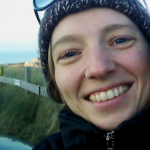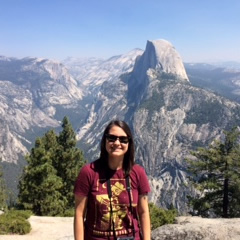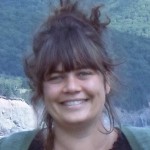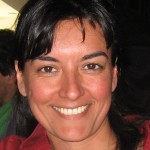Associate Professor
As a faculty member of the Department of Geography and the Earth System Science program, my main research theme is large-scale hydrology. I study the terrestrial water cycle of large river basins, continents, or the entire globe and investigate the effects of climate and global change on regional water resources and hydrologic regimes, including floods and droughts. Hydrological models, global data sets, and GIS and remote sensing tools are typical components of my research projects.
Graduate Students
PhD Student
Heloisa Ehalt Macedo is an Environmental Engineer with interest in large-scale Hydrology, GIS and Remote Sensing. Her research involves the river routing model HydroROUT for applications in water quality modeling.
 Maartje Korver
Maartje Korver
PhD Student
Maartje is interested in physical surface water processes and their responses to human influences and climate change. She currently works on modelling physical parameters for all lakes within the HydroLAKES data set, with a main focus on lake temperature dynamics.
 Mathis Messager
Mathis Messager
PhD Student
Mathis’s doctoral research focuses on improving our understanding and promoting the conservation of non-perennial rivers and streams, watercourses that periodically cease to flow or dry. From Himalayan snow-fed creeks and Saharan wadis, to small streams in British Columbian rainforests, most rivers and streams on Earth flow only part of the year, yet we know very little about them. This oversight contributes to the degradation of these ecosystems, the main source of water and livelihood for millions of people. Through his thesis, he intends to help correct this oversight and enable their conservation. His PhD is jointly supervised by Dr. Bernhard Lehner in the Global HydroLAB and by Dr. Thibault Datry at the French National Research Institute for Agriculture, Food, and Environment (INRAE). Personal website: https://mathismessager.weebly.com/
MSc/PhD Student
Penny uses an interdisciplinary approach to assess the effects of dams and reservoirs on human and non-human systems at the global scale. She is also the PhD lead coordinator of Global Dam Watch.
Alumni
BA&BSc/MSc Student/RA
My research focusses on the evolution of wetlands and floodplains with climate change. Encompassing a variety of transitional regions, wetlands are hotspots of biodiversity and ecosystem services, and play an important role in human civilization. I seek to apply climate change scenarios to wetland extent at a global scale to identify regions susceptible to change. Additionally, I hope to use these results to identify regions of high vulnerability and understand what resources, environments, and populations are at risk due to changing wetlands.
 Florence Tan
Florence Tan
MSc Student
My research is centered on global sediment dynamics with a particular focus on hillslope sediment connectivity. I am currently assessing the applicability and performance of various modelling approaches for representing sediment dynamics at large scales. This research is part of a larger global sediment river routing modelling effort.
PhD/Post-Doctoral Research Fellow 2009-2019
I am interested in Freshwater Ecology, Environmental Modeling, and Geographic Information Systems from a large-scale perspective. I specialize in river and lake networks, their ecosystem services, and human impacts that threaten freshwater integrity. My goal is to provide analysis, information and tools to researchers, resource managers, and policy makers to improve the status of freshwater ecosystems worldwide.
MSc/PhD, 2009-2018
Camille O.Dallaire is geographer interested in freshwater ecosystems. She uses GIS to answer questions related to biodiversity patterns through river classifications, and human alterations in rivers at large-scales (Greater Mekong Region, Canada, Globe).
 Ranish Shakya
Ranish Shakya
MSc Student, 2015-2017
Ranish worked on the fate modeling of contaminants in the river network and building a global database of wastewater treatment plants (WWTPs). The global WWTP database will help to answer questions such as how many people are connected to WWTP, how much wastewater is being treated, and what level of treatment is being implemented across the globe. This database and contaminant fate modeling will help to predict the concentration of contaminants in the river network downstream, eventually identifying river reaches with hot-spots of contaminants. The final goal of this analysis is to help in the decision making process such as updating the WWTP or updating the water treatment facility if the particular is a drinking water source.

Hana Moidu
B.A. & Sc. Geography & Biology, 2016-2017
I mapped critical watersheds to analyze the sustainability of clean drinking water provision in North America using the HydroSHEDS database.

Marina Smailes
B.A. & Sc. Sustainability, Science and Society, 2015-2016
I analyzed river lengths to determine the accuracy of DEM-based river network models versus satellite imagery of river channels.
 Irena Nedeva
Irena Nedeva
GIS Research Assistant, 2015
I produced a global lake layer that extends all the way to the poles. To do this, I relied on existing databases which are pieced together and cross-referenced to avoid iteration of known errors.
MSc 2012-2015
My research interests span the broad realm of human-environment interactions, specifically in the midst of natural disasters and anthropogenic climate change. My master’s thesis investigated to what extent global floodplains are shifting due to climate change and identify at-risk populations and ecosystems in a spatial context. The study incorporated global inundation maps, population density maps, climate change models, and crop data to inform floodplain agriculture and attempt to quantify changing flood extents on a global scale.
PhD, 2008-2014
In the broad context, I am interested in freshwater systems and anthropogenic impacts on these. At McGill, I concentrated on modelling surface water quality, determining the drivers of agricultural change at the farm level, developing scenarios of land use change for watersheds, and examining field level adaptations with regards to climate change. My goal is to provide decision makers and policy makers with scientific information based on available tools, new methods and rigorous analysis that account for uncertainties, to better manage the anthropogenic influences on our ecosystems.
 Etienne Fluet-Chouinard
Etienne Fluet-Chouinard
MSc, 2009-2012
During my time in the HydroLAB I worked on developing a method of spatial downscaling for coarse resolution inundation data. The result from applying this methodology is the new global map of inundation (GLIN). I am now pursuing my PhD at the University of Wisconsin-Madison, where I use global hydrological data to study wetland degradation, freshwater ecosystem stressors and conservation at the global scale.
Undergraduate Honours Students and Research Assistants
 William Xing
William Xing
BSc. Honours Geography and Minor Computer Science, Research Assistant
I am interested in the study and mapping of rivers, lakes, and reservoirs globally. My undergraduate honours research focused on the CO2 net effect through the creation of a hydroelectric reservoir by flooding a boreal black spruce forest. In HydroLAB, my research focuses on improving databases of dams and reservoirs at the global scale.

 Heloisa Ehalt Macedo
Heloisa Ehalt Macedo


 Camille O.Dallaire
Camille O.Dallaire
 Rachel Dryden
Rachel Dryden
